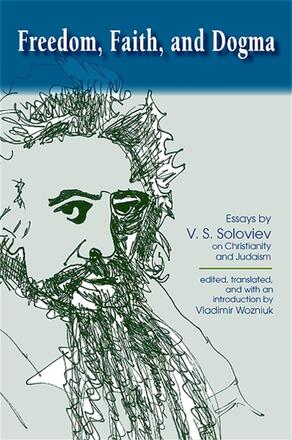
Freedom, Faith, and Dogma
Essays by V. S. Soloviev on Christianity and Judaism
Alternative formats available from:
A collection of works by nineteenth-century Russian religious philosopher V. S. Soloviev, critic of secularization, anti-Semitism, and the religious life of his time.
Description
Often remembered for his association with the Russian novelist Fyodor Dostoevsky, V. S. Soloviev (1853–1900) remains the foremost representative of ecumenism in nineteenth-century Russia. Working in the name of the Universal Church, with the goal of restoring its unity, he often criticized the institutional churches severely for their contradictions and imperfections.
Freedom, Faith, and Dogma is Vladimir Wozniuk's fourth volume of translations of Soloviev's writings. These essays display the Christian philosopher's concerns about the obstacles that religious and political dogma present to the free pursuit of faith. Many of them explore the reasons why neither Judaism nor Christianity was ever able to establish a truly just "kingdom of God." Several also reflect Soloviev's steadfast and outspoken championing of full religious and civic rights for Jews throughout Russia and all of Europe. Wozniuk's introduction places Soloviev squarely in the mainstream of Christian thought and highlights the concerns that dominate this collection: the meaning of church unification, the proper relationship between church and state, and how to deal with the tendency of the powerful to exploit the powerless, concerns that remain relevant to this day.
Vladimir Wozniuk is Professor of Political Science and Director of International Studies at Western New England College and Center Associate at Harvard University's Davis Center for Russian and Eurasian Studies. He has translated many of V. S. Soloviev's writings, including Enemies from the East? V. S. Soloviev on Paganism, Asian Civilizations, and Islam.
Reviews
"Wozniuk's translation is fluid and accessible, eloquently conveying Soloviev's own wit and erudition … it is undeniable that Soloviev was a capacious thinker with a controversial voice still needing to be heard." — Theological Book Review
"Wozniuk's latest volume is welcome, for it reminds us once again that Solov'ev is a major thinker who should be better known, not least because of his formative influence on Bulgakov, whose theology is now being widely discussed." — Modern Theology
"Over the past decade, no scholar had done more to make the so-called journalistic writings of Vladimir Sergeevich Solov'ev (1853–1900) accessible to an anglophone audience than Vladimir Wozniuk … Wozniuk's effort in this volume, as in the previous three, is commendable. He is especially attentive to the demands of translation, rendering all eleven essays in precise, fluid English." — Canadian Slavonic Papers
"…Wozniuk has cemented his role as a major translator of the influential, erudite, and eclectic pre-revolutionary Russian philosopher, Vladimir Soloviev." — Slavic and East European Journal
"This represents a crucial addition to the existing body of translations of the first great Russian philosopher and of Russian philosophy as such. It not only extends Wozniuk's work beyond his previous translations of Soloviev but also responds vitally to recent discussions of liberalizing tendencies in Russian philosophers' engagement with the Orthodox Church and, more broadly, with religious issues." — Robert Bird, author of The Russian Prospero: The Creative Universe of Viacheslav Ivanov